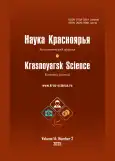Оценка современного состояния рынка труда Смоленской области
- Авторы: Литвищенко К.С.1, Тарасова Е.В.1
-
Учреждения:
- Смоленский институт экономики – филиал Санкт-Петербургского университета технологий управления и экономики
- Выпуск: Том 14, № 2 (2025)
- Страницы: 80-96
- Раздел: Статьи
- Статья опубликована: 30.06.2025
- URL: https://journal-vniispk.ru/2070-7568/article/view/304204
- DOI: https://doi.org/10.12731/2070-7568-2025-14-2-296
- EDN: https://elibrary.ru/QSCNWJ
- ID: 304204
Цитировать
Полный текст
Аннотация
В условиях быстрого изменения внешней среды региональные рынки труда также подвержены трансформации. Выявление направлений этой трансформации имеет ключевое значение для разработки стратегий экономического развития региона и для обеспечения благосостояния населения.
Цель исследования – оценить текущее состояние рынка труда Смоленской области.
Материалы и методы. Исследование проведено на основе данных территориального органа Федеральной службы государственной статистики по Смоленской области. Для проведения исследования использовались статистические методы. Для представления полученных результатов использовались табличные и графические методы.
Результаты. Рынок рабочей силы Смоленской области начинает функционировать в новых условиях. Безработица снизилась до самых низких значений. После продолжительного периода времени значительно возросло перемещение работников между фирмами, количество предлагаемых рабочих мест превысило аналогичный показатель предыдущих периодов.
Область применения результатов. Полученные результаты могут быть применены в работе службы занятости Смоленской области для информирования работодателей и населения, а также при проведении лекционных и практических занятий по экономическим дисциплинам.
Порядок реакции на неблагоприятные экономические условия остается стабильным. Смягчение экономических и социальных шоков происходит в основном за счет снижения заработной платы работников.
Ключевые слова
Об авторах
Ксения Сергеевна Литвищенко
Смоленский институт экономики – филиал Санкт-Петербургского университета технологий управления и экономики
Автор, ответственный за переписку.
Email: imesmol@mail.ru
ORCID iD: 0000-0001-7166-5948
доцент кафедры «Экономика и сервис», кандидат экономических наук, доцент
Россия, ул. Смольянинова, 5, г. Смоленск, 214031, Российская Федерация
Елена Владимировна Тарасова
Смоленский институт экономики – филиал Санкт-Петербургского университета технологий управления и экономики
Email: Lenysia1981@yandex.ru
ORCID iD: 0000-0001-8520-611X
доцент кафедры «Экономика и сервис», кандидат экономических наук, доцент
Россия, ул. Смольянинова, 5, г. Смоленск, 214031, Российская Федерация
Список литературы
- Апатова, Н. В., & Деркач, А. А. (2017). Социальные сети как рынок труда. В кн.: Теория и практика экономики и предпринимательства: Труды XIV Международной научно-практической конференции, Симферополь-Гурзуф, 20–22 апреля 2017 года/ Крымский федеральный университет им. В.И. Вернадского, Институт экономики и управления, кафедра бизнес-информатики и математического моделирования. Симферополь-Гурзуф: ИП Бровко А.А., с. 261. EDN: https://elibrary.ru/ZOTRBN
- Гимпельсон, В. Е., & Зудина, А. А. (2020). Некогнитивные компоненты человеческого капитала: что говорят российские данные. Вопросы экономики, (11), 5–31. https://doi.org/10.32609/0042-8736-2020-11-5-31 EDN: https://elibrary.ru/XUEJIT
- Гимпельсон, В. Е., & Зинченко, Д. И. (2021). Физики и лирики: кто российскому рынку более ценен? Вопросы экономики, (8), 5–36. https://doi.org/10.32609/0042-8736-2021-8-5-36 EDN: https://elibrary.ru/ANSQPE
- Гимпельсон, В. Е. (2022). Зарплата и потоки на российском рынке труда в условиях коронакризиса. Вопросы экономики, (2), 69–94. https://doi.org/10.32609/0042-8736-2022-2-69-94 EDN: https://elibrary.ru/JJJWHG
- Гимпельсон, В. Е., & Капелюшников, Р. И. (2022). Рутинность и риски автоматизации на российском рынке труда. Вопросы экономики, (8), 68–94. https://doi.org/10.32609/0042-8736-2022-8-68-94 EDN: https://elibrary.ru/HSIVVK
- Головко, М. В., & Плотников, В. А. (2022). Цифровые тренды и трудовые ресурсы: анализ взаимосвязей. Ученые записки Международного банковского института, (1), 91–102. EDN: https://elibrary.ru/NBMWTI
- Десфонтейнес, Л. Г., & Корчагина, Е. В. (2019). Рынок труда в России: особенности возрастной и гендерной структуры. Журнал правовых и экономических исследований, (3), 233–237. https://doi.org/10.26163/GIEF.69.25.040 EDN: https://elibrary.ru/BRVKRZ
- Долженко, Р. А. (2014). Новые формы трудовых отношений: уточнение понятий. Вестник Алтайского государственного аграрного университета, (1), 168–173. EDN: https://elibrary.ru/RUVNMB
- Егазарьянц, К. А. (2023). Влияние специальной военной операции на формирование человеческого капитала в России. В кн.: Экспертные институты в XXI веке: цивилизационные и цифровые концепции меняющегося мира: Сборник научных трудов Второй международной научно-практической конференции, Иркутск, 16–17 июня 2023 года/ Науч. редактор Т. И. Грабельных. Иркутск: Иркутский государственный университет, с. 601–605. EDN: https://elibrary.ru/CPXHNG
- Жданова, Д. А., & Барыкин, С. Е. (2024). Цифровая трансформация кадровых агентств: нейро-работники и персонал как услуга. Современная наука: актуальные проблемы теории и практики. Серия: Экономика и право, (12), 21–25. https://doi.org/10.37882/2223-2974.2024.12.06 EDN: https://elibrary.ru/MHYWRE
- Капелюшников, Р. И. (2020). Универсальный базовый доход: есть ли у него будущее? Вопросы экономики, (8), 95–127. https://doi.org/10.32609/0042-8736-2020-8-95-127 EDN: https://elibrary.ru/UIBFNY
- Капелюшников, Р. И. (2021). Отдача от образования в России: ниже некуда? Вопросы экономики, (8), 37–68. https://doi.org/10.32609/0042-8736-2021-8-37-68 EDN: https://elibrary.ru/PHQPVC
- Капелюшников, Р. И. (2022). Анатомия коронакризиса через призму рынка труда. Вопросы экономики, (2), 33–68. https://doi.org/10.32609/0042-8736-2022-2-33-68 EDN: https://elibrary.ru/ZAPVNU
- Капелюшников, Р. И. (2023). Российский рынок труда: статистический портрет на фоне кризисов. Вопросы экономики, (8), 5–37. https://doi.org/10.32609/0042-8736-2023-8-5-37 EDN: https://elibrary.ru/USUZBY
- Колосова, А. И., Рудаков, В. Н., & Рощин, С. Ю. (2020). Влияние работы по профилю полученной специальности на заработную плату и удовлетворенность работой выпускников вузов. Вопросы экономики, (11), 113–132. https://doi.org/10.32609/0042-8736-2020-11-113-132 EDN: https://elibrary.ru/QHJJEK
- Котляров, И. Д. (2015). Нестандартные формы занятости: позитивные, негативные, нейтральные. Journal of Economic Regulation, 6(4), 28–36. https://doi.org/10.17835/2078-5429.2015.6.4.028-036 EDN: https://elibrary.ru/VIKMVR
- Литвищенко, К. С., & Овсянникова, М. А. (2022). Тенденции социально-экономического развития региона. Наука Красноярья, 11(4-4), 30–36. https://doi.org/10.12731/2070-7568-2022-11-4-4-30-36 EDN: https://elibrary.ru/JMZDXY
- Плещенко, В. И. (2022). К вопросу об архаизации труда и потребления в современном российском обществе. Россия и современный мир, (2), 228–243. https://doi.org/10.31249/rsm/2022.02.13
- Плещенко, В. И. (2024). Рост конкуренции на рынке неквалифицированного труда в условиях экономики по требованию. Мотивация и оплата труда, (2), 160–164. EDN: https://elibrary.ru/UZQCXF
- Плотников, В. А. (2022). Трансформация трудовых ресурсов в цифровой экономике. Современная наука: актуальные проблемы теории и практики. Серия: Экономика и право, (3), 196–199. https://doi.org/10.37882/2223-2974.2022.03.30 EDN: https://elibrary.ru/JMKSNS
- Ощепков, А. Ю. (2020). Межрегиональные различия в оплате труда в России: роль долгосрочных структурных факторов. Вопросы экономики, (11), 86–112. https://doi.org/10.32609/0042-8736-2020-11-86-112 EDN: https://elibrary.ru/JIBPDL
- Официальный сайт Федеральной службы государственной статистики. Получено с https://rosstat.gov.ru
- Официальный сайт территориального органа Федеральной службы государственной статистики по Смоленской области. Получено с https://sml.gks.ru
- Официальный сайт службы занятости населения по Смоленской области. Получено с https://rabota.smolensk.ru
Дополнительные файлы










